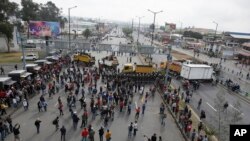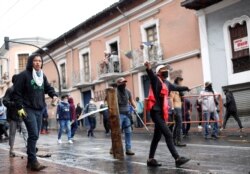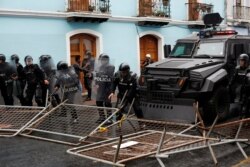Ecuador's President Lenin Moreno declared a state of emergency Thursday as protests broke out nationwide over the end of decades-old fuel subsidies as part of a $2 billion government fiscal reform package.
"Down with the package!" protesters shouted, referring to measures enacted this week as Moreno sets the Andean oil producer on a centrist path after years of leftist rule.
With the fuel measure taking effect Thursday, taxi, bus and truck drivers blocked streets in the highland capital Quito and in Guayaquil on the Pacific coast, while bus stations were closed. Indigenous groups, students and unions joined the action, blocking roads with rocks and burning tires.
In Quito, masked demonstrators threw stones at riot police who responded with tear gas and deployed armored vehicles.
"It's an indefinite action until the government overturns the decree on subsidies. We're paralyzing the nation," said bus transport leader Abel Gomez.
Officials say the elimination of fuel subsidies was necessary to lift the economy and stop smuggling.
Moreno, who won election in 2017 to replace Rafael Correa, told reporters the "perverse" subsidy, in place for 40 years, had distorted the economy and protests would not be allowed to paralyze Ecuador.
"To ensure citizens' security and avoid chaos, I have ordered a national state of emergency," the president said of the measure that suspends some rights and empowers the military to keep order. "I have the courage to make the right decisions for the nation."
Arrests, looting
Some groups of protesters trying to reach the presidential palace in downtown Quito clashed with police. In Guayaquil, several shops were looted, authorities said.
Interior Minister Maria Romo said 19 people were arrested for blocking roads and other crimes.
"The lack of transport affects us all, but equally the rise in gasoline prices will affect us," said Cesar Lopez, 39, walking to his business in Quito.
With a population of more than 17 million people, Ecuador has a long history of political instability. Street protests toppled three presidents during economic turmoil in the decade before Correa took power in 2007.
Economy Minister Richard Martinez said Wednesday that Ecuador hoped to save about $1.5 billion a year from eliminating fuel subsidies. Along with tax reforms, the government would benefit by about $2.27 billion, he said.
On Tuesday, Ecuador announced it was leaving the Organization of the Petroleum Exporting Countries (OPEC) to pump more oil and raise revenues. Ecuador pumps 545,000 barrels per day.
State energy company Petroecuador said oil facilities were operating normally despite Thursday's unrest.
Fiscal deficit
The government wants to reduce the fiscal deficit from an estimated $3.6 billion this year to under $1 billion in 2020.
Ecuador's debt grew under Correa, who endorsed Moreno in the 2017 election but has since become a critic of his successor's turn toward more market-friendly economic policies.
Moreno's government has improved relations with the United States and reached a $4.2 billion deal with the International Monetary Fund in February. But skepticism of the IMF runs strong in Ecuador and throughout Latin America, where many blame austerity policies for economic hardship.
"We'll close all the main roads," said taxi driver Sergio Menoscal, 55, helping to block streets in Guayaquil.
"We're tired of false promises ... we can't be blind to a government that has done nothing for the people."







